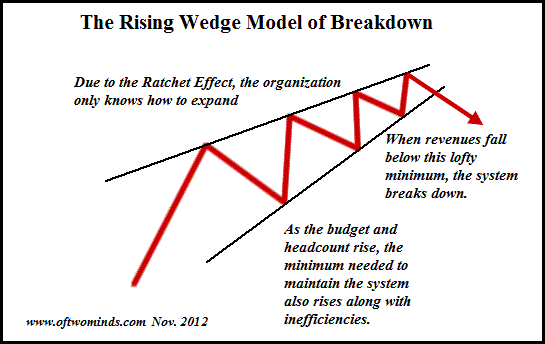Every failing organization, from empires to school districts, responds to its
embarrassingly visible failure
by proclaiming one reform after another. To take but a few from a long list, China
is "reforming" its hopelessly corrupt, debt-based central-planning economy, President
Obama is "reforming" the Global Surveillance State (into a presumably
kinder, gentler machine gun hand?), The European Union is "reforming" its
banking sector and the overly complex U.S. Sickcare system is
being reformed with 2,300 pages of additional complexity under the Orwellian title of
Affordable Care Act (ACA), a.k.a. ObamaCare.
The one dynamic that matters is of course left unsaid: the inability of the Status
Quo to reform itself, i.e. undertake fundamental, systemic reforms. This inability has
many facets but only one root: political sclerosis caused by entrenched, vested interests
seeking to protect their perquisites and power.
This is as true of local school districts as it is of entire states.
Here is my scale-invariant summary of the Status Quo:
1. An economy that is controlled by the government is one in which political power, not the
market, controls the distribution of national income. Politics is the arena in which the
national income is distributed. The primary contestants are entrenched, vested interests
seeking to protect their perquisites and power.
2. A government in which political power is for sale to the highest bidder puts the wealthy
at an extreme advantage, as they have the means to buy political power to conserve and
expand their share of the national income.
3. In order to do the bidding of the financial Elite, the political Elite redistributes
enough national income to the bottom 50% and retirees to buy their silence/complicity.
4. A nation in which political power is for sale is one in which the rule of law is bent
to serve those with power.
That the relentless advocacy of one’s own interests magically creates a common good
is the core of our secular faith; what if this is false? This is not just the
secular faith in America, but in China; "to get rich is glorious" implicitly embodies
a "trickle down" economic view in which Chinese millionaires whose sons own multiple
$250,000 autos are good for China because that extreme concentration of wealth will
supposedly trickle down to everyone lower in the food chain.
Orwell called this "some are more equal than others": in other words, beneath the
glossy PR veneer of trickle-down economics, the super-wealthy are entitled to their
wealth by the natural order of inequality. Never mind the system is rigged in their favor;
they "deserve it" in the same way that feudal lords "deserved" their estates.
In Nature the ability to reform is called adaptation. Organisms and species that are
unable to adapt when selective pressure is applied vanish from the Earth. Humans and
human organizations are no different; individuals and organizations that are unable
to respond to selective pressure with real self-reform/transformation will also
fail and disappear.
The political and financial Status Quo is incapable of true reform, because real reform
threatens the perquisites and power of entrenched vested interests, what I call fiefdoms.
The other dynamic I have described is the Rising Wedge
Model of Breakdown: entrenched interests within organizations only know how to expand,
and this leads to ever-higher minimum levels of funding and headcount. Reform is
rendered impossible because the organization breaks down once funding dips below the
lofty minimum.

If we combine these three dynamics--the relentless, single-minded advocacy of
self-interest in rigging the system; a multiplicity of political "third rails," i.e.
constituencies and
fiefdoms that are politically untouchable, and the Rising Wedge Model of Breakdown,
we understand why the Status Quo is incapable of reforming itself.
That leaves breakdown as the only possible endpoint.
Though the Status Quo still has enough resources to put off the eventual breakdown and collapse
for a while longer, I expect an initial crisis to emerge in 2014-2015 that is resolved by
the usual politically expedient half-measures. The sigh of relief that "everything's
been fixed" may last two to three years to 2017-18, and then the ultimate crisis will
gather force until it is beyond half-measures, likely in the 2021-22 timeline.